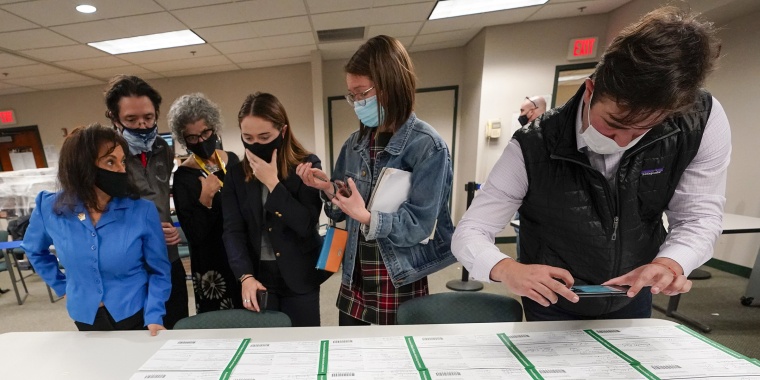Provisional ballots — used by voters if there's a question about their eligibility when they show up at the polls — are slowing the count of the presidential election three days after polls closed. And there could be enough provisional ballots to affect the race in some key states.
Such ballots are used only when a voter has an issue that needs to be resolved before their vote can be counted, so they take longer to process than regular ballots and can be subject to legal action and challenges.
They are a fallback when a voter can't immediately prove they're eligible to vote when they show up at the polls or their information doesn't match what's listed on voter rolls.
The voter may have moved, but their new address is not reflected on the voter roll in their new precinct. They may have forgotten to bring an ID in a state that requires one to vote. They may have changed their name or their name may be misspelled on the rolls. Or they may have been removed from the rolls by a glitch or regular purge of voters who haven't cast a ballot in a long time.
And especially relevant this year, in some states, if a voter requested an absentee ballot but decided for whatever reason to vote in person, they may have been required to bring their absentee ballot to the voting place, where they would then hand it over in exchange for a new in-person ballot. That's done to ensure they don't vote twice.
If the voter never received their requested absentee ballot or forgot to bring it to the polls, they may end up having to vote provisional instead.
All of those issues take extra time to resolve as officials check to make sure that those provisional ballots are indeed eligible to be counted and to ensure that that voter didn't already vote absentee by mail.
Provisional ballots typically make up a tiny fraction of the vote — just 1.8 percent of votes cast in the 2016 presidential election, about 70 of which were ultimately accepted, according to the U.S. Election Assistance Commission— and have rarely altered the outcome of elections in the past.
"I'm not sure I've ever heard of an election turning on provisionals," said Paul Smith, a veteran elections lawyer and the vice president of the Campaign Legal Center, a non-partisan non-profit.
But things are different this year due to the large use of mail-in ballots amid the Covid-19 pandemic.
In a tight race, when even a small number of votes could potentially sway the result, media outlets that are forecasting the election want to wait to see what those ballots look like before they call races.
"The traditional assumption is that most provisional ballots are cast by Democrats...but that may not be this situation," said Smith. "We've never had an election like this, and it's really hard to extrapolate from past elections the partisan makeup of this group of people — and it's a lot of people."
When turnout is high — 2020 looks on track to break records — that means more first-time and irregular voters turned out, which means more provisional ballots typically get issued because those voters are not as familiar with the process and their information may not be up to date.
"The truth is that there may be many people coming to the polls for whom this is not a regular occurrence. They make mistakes," said Ted Shaw, the Julius L. Chambers Distinguished Professor of Law at the University of North Carolina. "And the fact that there are more people means there are more who may make errors."
One of the states that NBC News has not yet called is Pennsylvania, which would hand Joe Biden the presidency if his lead holds, as officials there work through the provisional and other ballots.
"The ballots are being counted. These are legal votes," Pennsylvania Attorney General Josh Shapiro said on MSNBC. "I would just urge everyone to take a deep breath. I know it's hard. Everyone wants to have finality."
And states give voters a chance to fix those issues, which takes time, too.
Provisional ballot rules vary by state, but in Pennsylvania, county boards of election have to adjudicate each individual ballot to determine whether it should be counted or not and they have one week to do it.
Pennsylvania officials said Friday morning they were just beginning to process provisional ballots and said they had at least 85,000, which could theoretically be enough for Trump to overcome Biden's roughly 19,000 vote lead.
In Georgia, meanwhile, where Biden leads by about 1,600 votes, officials said they had about 13,000 provisional ballots.
Provisional ballots have historically skewed Democratic, but this year there may be indications they are tilting Trump. That could be because more Trump voters showed up to cast their ballots in person, while many Democrats mailed the ballots.
"This is a year unlike any other, Shaw said.
A version of this story originally appeared on NBCNews.com.
